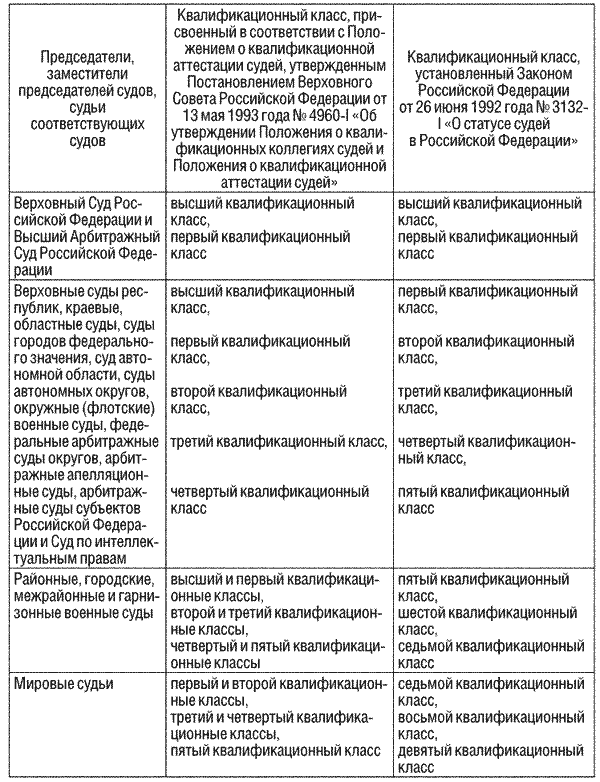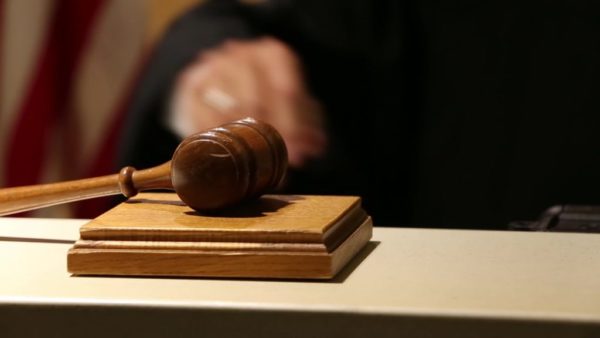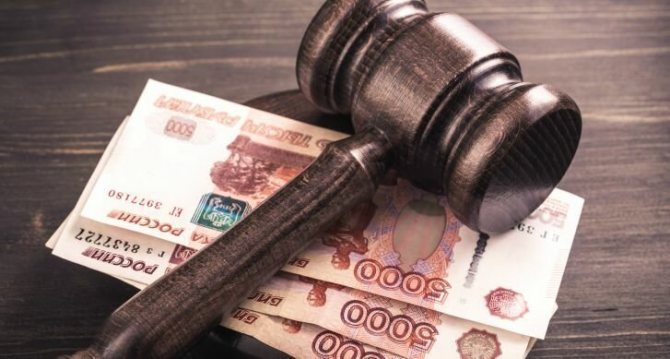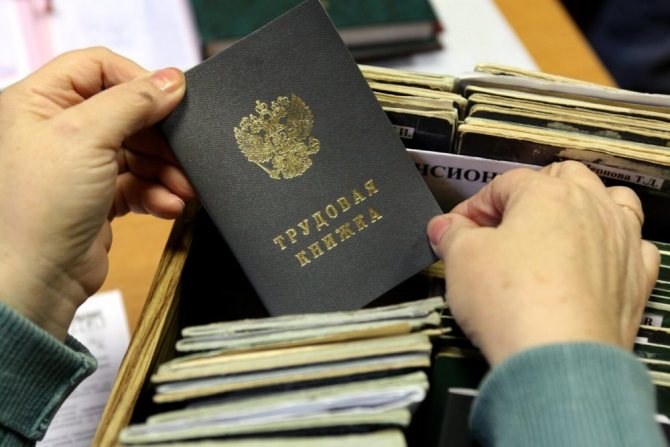Working in a judicial position involves a large number of guarantees, incl. financial. Their pensions are a lifetime allowance, not much smaller in size than their salaries. But a standard insurance pension on a general basis is also possible. Previously, the possible pension of the current heads of the Supreme and Constitutional Courts of the Russian Federation was calculated.
Types of payments for retired judges
Citizens of the Russian Federation who have at least twenty years of legal experience, which were spent in the following positions, can receive pension benefits:
- arbitrator or judge, regardless of category;
- prosecutor, lawyer, their deputies and assistants (or any other profession requiring specialized legal education);
- judicial authorities, any position related to legal proceedings.
A judge who has retired or changed positions, starting at age 55 (50 for women), can apply for one of three types of payments:
- Standard insurance pension paid to Russian citizens on a general basis.
- Longevity security (Law 4468-I).
- Lifetime maintenance (Law 3132-I).
The insurance pension is calculated in accordance with payments deducted monthly from the judge’s salary to the Pension Fund. Despite the fact that the final amount is noticeably higher than the national average, this type of judge’s pension is the smallest, so you should only apply for it if you do not have enough experience for the second and third options. A judge who has worked for less than 10 years in the legal field is not entitled to a specialized pension.
With 25 years of service, a judge has the right to immediate retirement based on length of service , even if retirement age has not yet been reached. In contrast to the third point with monetary allowance, payment of salary based on length of service is carried out according to Law No. 4468-I, common to all employees of law enforcement agencies. Article 14 states that a pensioner has the right to receive benefits from 50 to 85% of salary depending on length of service (50% after 20 years, then an additional 3 percent for each subsequent year).
Upon reaching 20 years of experience, a lawyer has the right to choose a monthly lifetime allowance amounting to 80 to 85% of the earnings of an active judge in a similar position. The size of the percentage depends on the length of service - for each additional year one percent is added. The option of lifelong maintenance is described in the specialized law 3132-I on the status of judges.
Support for judges of the Constitutional Court is stipulated by a separate government decree number 425
Also, Resolution No. 425 describes the procedure for payments to dependents and family members of a deceased (or deceased) judge, if at the time of death he has not yet resigned.
Additional material support
In addition to the basic pension or lifelong salary, a judge can receive payments in the presence of state awards. Article 1 No. 21-FZ defines the following categories of persons who are entitled to additional security:
- Heroes of the USSR and Russia;
- awarded the orders of St. Andrew the First-Called, Glory, Lenin, “For Services to the Fatherland”, “For Service to the Motherland”;
- winners of state awards of the USSR and the Russian Federation;
- champions of the Olympic and Paralympic Games.
The amount of payments is indicated in the second article of the same law and ranges from 250 to 415 percent of the all-Russian social pension.
What is PSS?
PSS is exactly what we are used to understanding as a judge’s pension in the Russian Federation. Retired judges, judges who have become arbitrators, who have switched to work in government organizations and who have:
- twenty years of judging experience;
- less than twenty years of judicial experience, but having reached the minimum age of fifty years for female judges and fifty-five years for male judges;
- Judicial experience of at least ten years, cumulative legal experience = 25 years and have reached retirement age (60 and 55 years for men and women, respectively);
To assign a PSS, years of work are calculated:
- in Russian courts of all categories as judges or arbitrators;
- in the apparatus of the courts of the Russian Federation in other positions, as well as in the apparatus and institutions of the Ministry of Justice;
- lawyer, investigator, assistant, deputy or directly prosecutor, as well as in another position where legal education is necessary.
Lifetime pension amount
Like most civil servants, judges' salaries are quite low: the head of the Constitutional Court receives just over 30 thousand rubles monthly. At the same time, a system of incentives and modifiers works: for a working judge, the bonus only for the qualification class ranges from 30 to 150%.

Table of qualification classes of judges
Most bonuses received while in service are not included in the regular pension. In the case of pension benefits, the amount of payments will be affected by:
- length of service (as indicated above - from 80 to 85%);
- the title of professor or associate professor, as well as Honored Lawyer of the country;
- candidate and doctoral degrees;
- knowledge and use of foreign languages in international affairs (up to 20% for judges of the Constitutional Court).
Important! Judges' pensions are not taxed, which is another feature of these payments.
Table. Judge's salary depending on length of service
| Length of service | Percentage increase |
| From 24 to 60 months | 15% |
| From 60 to 120 months | 25% |
| From 120 to 180 months | 30% |
| From 180 to 240 months | 40% |
| More than 240 months | 50% |
*The term bonus is not cumulative and is calculated from the starting salary.
Since 2012, a judge’s work experience includes military service, training in a specialty, and service in government departments. The general “legal” experience includes work in law firms, investigative and prosecutorial bodies, and private practice.
Scientific degrees and titles also provide a percentage increase. A candidate or associate professor will receive 5% of the salary standard, all others will receive 10%. A regional coefficient is also considered: working in the Far North or the Far North of the country will be noticeably more profitable both in terms of accrued length of service and in terms of total salary (standard modifier x1.5).
In practice, even a low class judge with sufficient length of service gives the right to earn 70-80 thousand rubles. Payments are made directly from the federal budget; the regional administration can only pay additionally to all judges at the same time, setting increased coefficients.
Calculation of a judge's pension
When applying for a pension, the judge chooses one of three options. It is not permitted to receive multiple state pension options at the same time. The easiest way to show the practice of calculation is with specific examples.

Judges can choose between three types of pensions
Let's start with the general civil insurance pension. The formula for it looks like this: individual coefficient * point value + (fixed payment * increase coefficient). Let’s say a judge receives a monthly salary of 70 thousand rubles. Under pension legislation and modifiers adopted in 2020, this gives about 8.25 pension points annually. At the current value of a pension point of 87.24 rubles for 20 years of service, the total amount of payments will be 81.5 * 8.25 * 20 = 14394.6 rubles + 5334 rubles of fixed payment. In total, the judge will receive 19,728.6 rubles monthly.
When applying for a long-service pension, the judge’s salary is multiplied by a percentage coefficient, which depends on the legal experience. Here the calculation is much simpler: after a judge reaches 20 years of service, his pension will be 50% of his salary, and each year worked will add another three percent on top to a limit of 85%. With 20 years of service and 70 thousand salary, the judge will receive a pension of 35 thousand, with 25 years - 48,750 rubles (65% of the salary), with 30 years or more - 63,750 rubles (80% of the salary).
Finally, a lifetime allowance will give 56 thousand income under the same starting conditions, since the countdown starts not from 50, but from 80%. With 25 years of service, the pension will also reach its limit of 63,750 rubles.
Calculator for calculating the lifetime allowance of a judge
The calculator below will help you calculate your judge's lifetime allowance.
Go to calculations
Question answer
Pension for judges who became disabled in 1999
The legislator establishes that judges who become incapacitated due to the performance of their powers or regardless of their official activities have the prerogative to calculate a pension in proportion to the salary of the judge currently serving.
Can a retired judge work as a judge?
Retired judges have recently been allowed to hold public office, as well as work as arbitrators and act as arbitrators. Moreover, salary does not in any way affect the payment of pension benefits.
Pension for assistant judge
From all of the above, the following conclusions can be drawn:
- if there is length of service, the judge has the right to choose between a pension and lifelong maintenance;
- In terms of the volume of payments, PSS is much more attractive than regular pension compensation;
- After a judge’s well-deserved retirement, he remains a member of the judicial community and retains all preferences;
- For a constitutional judge, it is necessary to serve in office for 15 years in order to have the prerogative to issue a PSS;
- 80% of the salary of a current judge is allocated for the indefinite maintenance of a retired judge;
- A distinctive feature of calculating salary for a military judge is considered to be 15 years of experience;
- Employees of the judiciary receive 2-3 times less income than guards of justice. Consequently, their pension payments are small;
Issues regarding the assignment of content are considered by the Commission at the Judicial Department.
What is the pension of a judge in Russia? Everything about the conditions, calculation procedure, as well as the procedure for applying for benefits for this category of people can be found in this article. We also recommend reading general information about the types of pension payments and their meaning ..
How to apply for a pension?
Receipt of funds from the federal budget is carried out at the request of the judicial department or regional administration. To arrange maintenance, the easiest way for a judge is to contact the place of previous work: it is the courts that decide the issue of accrual; the Pension Fund is not involved in the matter. The former judge must provide a set of documents:
- Handwritten content statement.
- Identity card (general civil or service passport of the Russian Federation).
- Work book confirming the declared length of service.
- SNILS card.
- Confirmation of qualification level.
- Certificates or evidence of regalia providing additional benefits.
The review takes two working weeks, after which the applicant is notified of the decision. Payments are made starting from the next calendar month after registration of the application.
Summarizing the above, we can highlight a number of features of the formation of pensions for judges and other court employees:
- payments apply to judges with significant length of service;
- the lifelong maintenance provided in the worst case is 4/5 of the salary, and is not taxed;
- the issue of payments is decided by the judicial panel; the Pension Fund does not participate in the discussion.
An important nuance: when receiving a pension, a judge does not have the right to continue practicing law, and officially returning to work will lead to a freeze in payments. The law has three exceptions in this regard: literature, science and teaching.
Registration of teaching staff
To obtain lifelong security, the Judicial Department is provided with:
- passport (personal ID);
- application for registration of pension benefits. Download the application form HERE;
- employment history;
- documents confirming titles and class, qualifications;
- in the case of an already assigned insurance pension - a document confirming the pension payments being made;
- SNILS.
The submitted documents are reviewed within 15 days, after which a decision is made to appoint a teaching staff, or facts that impede the appointment are indicated.
Provision of military judges
Retired judges who worked in military courts receive exactly the same subsidies from the federal budget as civilian specialists. Both the age of exit and the amount of compensation, as well as other criteria, coincide. The exception will be the basic length of service - for the military, the minimum period will be 15 years.

To qualify for a long-service pension, military judges must work less than civilians - 15 years
Retired military judges receive additional benefits for injuries sustained as a result of their service. For example, lifetime maintenance can be received along with disability benefits if the judge becomes disabled due to a military injury. This often happens to lawyers who worked in hot spots in their youth. Also, disabled military judges are entitled to increased benefits.
Useful video
You can find out what kind of pension a federal judge has in the following video:

Working in a judicial position involves a large number of guarantees, incl. financial. Their pensions are a lifetime allowance, not much smaller in size than their salaries. But a standard insurance pension on a general basis is also possible. Previously, the possible pension of the current heads of the Supreme and Constitutional Courts of the Russian Federation was calculated.
Denial of lifelong maintenance
Each application submitted for lifelong pension provision is considered by a judicial panel in a special manner. To refuse to issue funds to a judge who has worked for more than 20 years, the grounds must be truly significant.
- Any crime, regardless of length of service, deprives the right to work in the judiciary and leads to an automatic denial of lifelong support. The same applies to crimes committed after retirement.
- A change of citizenship is also grounds for refusal or withdrawal of benefits. The law clearly states that a citizen of the Russian Federation can receive maintenance.
- Judges who have been recalled in accordance with current legislation may also be deprived of their salaries. Here, both the reasons for the recall and the consequences of the actions that caused it play an important role.
Sometimes the denial of support is caused by a disagreement with issues in the length of service: private practice or work in a law office may, for various reasons, not be counted as legal experience. In this case, the issue is resolved either at a meeting of the board or in court.
Conditions of appointment
According to normative act N 669кд/234, a judge has the right to issue lifelong maintenance payments for:
- having 20 years of work experience in this position and reaching 50 and 55 years of age for men and women, respectively (it is worth noting that in cases provided for by law, when assigning EPS, the age requirement may not be taken into account);
- having accumulated 25 years of total experience in the field of jurisprudence, 10 of which were spent working as judges, as well as reaching 60 years of age for men and 55 years for women;
- having 10 years of judicial experience and reaching 55 and 50 years of age for a man and a woman, respectively. Benefits for this category of citizens can be assigned when they were engaged in other paid work and, on the basis of this, received the right to receive payments under compulsory pension insurance. In other words, a citizen receiving benefits through the Pension Fund of the Russian Federation, upon reaching 55 years of age, has the right to choose which pension he will receive in the future: insurance or state.
It is worth noting that the law also provides for the procedure for transferring Crimean servants of Themis from Ukrainian to Russian legislation. Thus, normative act No. 669kd/234 states that retired judges who permanently resided in the territory of Crimea before March 18, 2014 and received (or had the right to receive) monthly payments of lifelong maintenance, in accordance with Russian legislation, have the right to accrue the specified benefits.

Servants of justice who have not earned a certain length of service to qualify for a lifetime allowance may apply for an insurance pension in the manner and under the conditions provided by law. In accordance with Federal Law No. 400, the appointment of an insurance benefit to a judge is possible in the case when, after retirement from the judiciary, he continued his career in the legal field, for example, became a private lawyer, detective, etc.
In this case, based on the contributions paid to the Pension Fund, the citizen can claim insurance payments.








